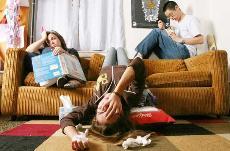
Students experience feelings constantly, depending on events that happen in their lives and Parents and Families Services recently held a session to help students and parents recognize and cope with depression.
“November is the point where students get stressed out,” Jennifer Bell, director of parent and family services, said.
Bell said students begin to realize what their grades will be at the end of the semester and start getting stressed.
“It’s really more timing,” Bell said. “By Thanksgiving, if you’re battling a class, there’s not much time to rebound.”
Bell said students may believe they did not meet their personal or parental expectations. She said freshmen in particular are susceptible to experiencing emotions commonly linked to depression.
“Freshmen year, the majority of students achieve less than a 3.0 in their first semester,” Bell said.
She added the 2006 freshman class has a high school grade point average of 3.53.
“When you compare [the first semester’s college GPA] to a 3.53, some students consider that failure,” Bell said.
Students said the effect of pressure and school was apparent in their first semesters.
Josh Wilson, a sophomore in electrical engineering, said his roommate last year “dropped out because of grades” and stopped attending classes.
“He gave up after his first semester,” Wilson said.
Other students said they are currently experiencing stress from school.
“English is the bane of my existence and causes the most stress in my life,” Thomas Greenhalgh, a freshman in materials science and engineering, said.
He said he feels a lack of motivation to complete assignments because of the stress.
“I’m having to adjust to the realization that Bs and Cs are OK,” Greenhalgh said.
Academic difficulties are the most common for students. Some freshmen are not accustomed to having trouble in academics, which “can lead to depression,” according to Bell.
However, students said other factors can attribute to feeling depressed.
“Being away from family, being alone or relationship-type issues [can affect students],” Laura Adams, a freshman in political science said.
Adams said she wrote a research paper about depression in high school.
“Everyone gets sad and lonely,” she said. “[College is] a hard adjustment.”
A student should seek professional help when feelings of sadness or loneliness begin to interfere with everyday activities or last longer than a few days, according to Mike Bachman, associate director of the Counseling Center.
“[Students who] socially withdraw, are easily agitated, restless, have chronic fatigue, lack of motivation, feeling hopelessness, feeling self-blame or are self-critical [are suffering from common symptoms of depression],” Bachman said. “In more serious [cases of] depression are thoughts of death or suicide.”
Bachman said students have ways to cope with stress before reaching an intense stage of depression.
Friends are an excellent source of therapy, according to Bachman.
Other ways of dealing with stress include “relaxing for a bit, exercise, eating well or getting good sleep.”
Bell said there are also resources on campus available for students.
“First year course repeat allows students to retake up to two classes without penalties,” Bell said. “The whole point is [educators] recognize the freshman year is a transition year.”
Bachman said the counseling center in Student Health Services is open year-round for students. Urgent needs or problems can be accommodated by walk-in appointments.
“Students shouldn’t be hesitant to go even if they feel like their problem isn’t significant,” Bell said. “There’s no problem too small to get help on.”
Bell also said students feeling any kind of anxiety or depression are not alone.
“The whole University is here [to help],” Bell said.